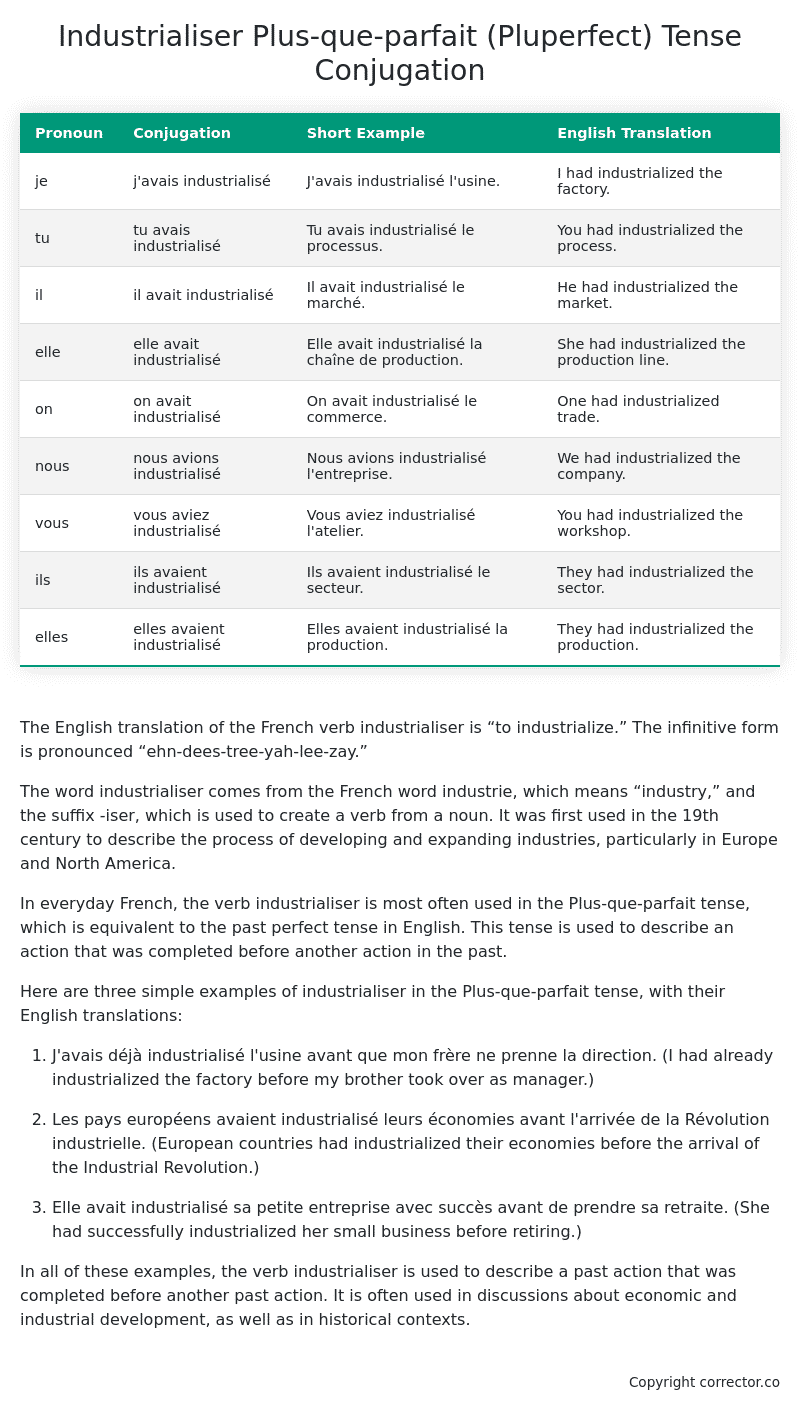Plus-que-parfait (Pluperfect) Tense Conjugation of the French Verb industrialiser
Introduction to the verb industrialiser
The English translation of the French verb industrialiser is “to industrialize.” The infinitive form is pronounced “ehn-dees-tree-yah-lee-zay.”
The word industrialiser comes from the French word industrie, which means “industry,” and the suffix -iser, which is used to create a verb from a noun. It was first used in the 19th century to describe the process of developing and expanding industries, particularly in Europe and North America.
In everyday French, the verb industrialiser is most often used in the Plus-que-parfait tense, which is equivalent to the past perfect tense in English. This tense is used to describe an action that was completed before another action in the past.
Here are three simple examples of industrialiser in the Plus-que-parfait tense, with their English translations:
-
J’avais déjà industrialisé l’usine avant que mon frère ne prenne la direction. (I had already industrialized the factory before my brother took over as manager.)
-
Les pays européens avaient industrialisé leurs économies avant l’arrivée de la Révolution industrielle. (European countries had industrialized their economies before the arrival of the Industrial Revolution.)
-
Elle avait industrialisé sa petite entreprise avec succès avant de prendre sa retraite. (She had successfully industrialized her small business before retiring.)
In all of these examples, the verb industrialiser is used to describe a past action that was completed before another past action. It is often used in discussions about economic and industrial development, as well as in historical contexts.
Table of the Plus-que-parfait (Pluperfect) Tense Conjugation of industrialiser
| Pronoun | Conjugation | Short Example | English Translation |
|---|---|---|---|
| je | j’avais industrialisé | J’avais industrialisé l’usine. | I had industrialized the factory. |
| tu | tu avais industrialisé | Tu avais industrialisé le processus. | You had industrialized the process. |
| il | il avait industrialisé | Il avait industrialisé le marché. | He had industrialized the market. |
| elle | elle avait industrialisé | Elle avait industrialisé la chaîne de production. | She had industrialized the production line. |
| on | on avait industrialisé | On avait industrialisé le commerce. | One had industrialized trade. |
| nous | nous avions industrialisé | Nous avions industrialisé l’entreprise. | We had industrialized the company. |
| vous | vous aviez industrialisé | Vous aviez industrialisé l’atelier. | You had industrialized the workshop. |
| ils | ils avaient industrialisé | Ils avaient industrialisé le secteur. | They had industrialized the sector. |
| elles | elles avaient industrialisé | Elles avaient industrialisé la production. | They had industrialized the production. |
Other Conjugations for Industrialiser.
Le Present (Present Tense) Conjugation of the French Verb industrialiser
Imparfait (Imperfect) Tense Conjugation of the French Verb industrialiser
Passé Simple (Simple Past) Tense Conjugation of the French Verb industrialiser
Passé Composé (Present Perfect) Tense Conjugation of the French Verb industrialiser
Futur Simple (Simple Future) Tense Conjugation of the French Verb industrialiser
Futur Proche (Near Future) Tense Conjugation of the French Verb industrialiser
Plus-que-parfait (Pluperfect) Tense Conjugation of the French Verb industrialiser (this article)
Passé Antérieur (Past Anterior) Tense Conjugation of the French Verb industrialiser
Futur Antérieur (Future Anterior) Tense Conjugation of the French Verb industrialiser
Subjonctif Présent (Subjunctive Present) Tense Conjugation of the French Verb industrialiser
Subjonctif Passé (Subjunctive Past) Tense Conjugation of the French Verb industrialiser
Subjonctif Imparfait (Subjunctive Imperfect) Tense Conjugation of the French Verb industrialiser
Conditionnel Présent (Conditional Present) Tense Conjugation of the French Verb industrialiser
Conditionnel Passé (Conditional Past) Tense Conjugation of the French Verb industrialiser
L’impératif Présent (Imperative Present) Tense Conjugation of the French Verb industrialiser
L’infinitif Présent (Infinitive Present) Tense Conjugation of the French Verb industrialiser
Struggling with French verbs or the language in general? Why not use our free French Grammar Checker – no registration required!
Get a FREE Download Study Sheet of this Conjugation 🔥
Simply right click the image below, click “save image” and get your free reference for the industrialiser Plus-que-parfait tense conjugation!

Industrialiser – About the French Plus-que-parfait (Pluperfect) Tense
Tense Formation
Common everyday usage patterns
Sequencing of past events
Background information
Hypothetical or reported speech
Interactions with other tenses
Summary
I hope you enjoyed this article on the verb industrialiser. Still in a learning mood? Check out another TOTALLY random French verb conjugation!


